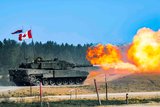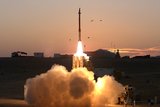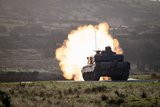US again warns Turkey on Russian missiles at NATO
The United States' new top diplomat met his Turkish counterpart on the sidelines of a NATO meeting and warned Ankara against choosing a Russian air defence system.
If Turkey goes ahead and deploys the Russian S-400 system, its radars and missile batteries will not be integrated with those of its NATO allies.
And such a purchase could also be judged a breach of a 2017 US sanctions law designed to punish customers of Russia's arms and aerospace industries.
Washington wants its NATO partners focused on threats from Russian hybrid warfare and on counterterrorism, and sees Ankara's decision as a mistake.
On 27 April, a day after he was sworn in as US secretary of state, former CIA boss Mike Pompeo raised the issue in talks with Foreign Minister Mevlut Cavusoglu.
After their talks, a senior State Department official told reporters Pompeo reminded his opposite number Turkey could face sanctions if it bought the S-400.
‘He urged Cavusoglu to closely consider NATO interoperable systems,’ the official said, adding that the meeting had been cordial and workmanlike.
‘And there was also a shared desire to find a common way forward on air defence for Turkey,’ the official said, sounding optimistic.
Immediately before the meeting, however, Cavusoglu had been dismissive.
Asked by a reporter whether Turkey would indeed buy the S-400, he referred to an already announced memorandum of understanding with Russia, asking rhetorically: ‘You mean in addition to the ones we already bought?’
And, pushed on when Moscow might actually deliver the system, he said simply: ‘Russia is speeding up the process.’
Washington and Turkey are longstanding allies but have fallen out over US support for Kurdish forces in Syria and the asylum granted to exiled cleric Fethullah Gulen.
In 2017, US lawmakers, seeking to punish Russia for its efforts to undermine Western democracy, passed the Counter America's Enemies Through Sanctions Act.
Under CAATSA, any entity doing business with Russia's state, semi-state and private defence and intelligence sectors could face economic sanctions.
Related Equipment in Defence Insight
More from Land Warfare
-
![US DoD task force’s DroneHunter acquisition lays groundwork for Replicator 2 CUAS strategy]()
US DoD task force’s DroneHunter acquisition lays groundwork for Replicator 2 CUAS strategy
As the US Department of Defense looks to counter the growing threat of uncrewed aerial systems to improve homeland security, the DroneHunter acquisition could point to future commercial innovation.
-
![Land forces review: Tanks, trucks and IFVs dominate but woes remain for Ajax]()
Land forces review: Tanks, trucks and IFVs dominate but woes remain for Ajax
This year has begun with main battle tanks taking the lead while orders for large logistics and support vehicles continued from last year. Additionally, two of the British Army’s most significant contracted vehicle programmes, Ajax reconnaissance vehicle and Challenger 3 tank, continued to make news in January.
-
![Canada looking to expedite purchase of armoured fighting vehicle and a new tank]()
Canada looking to expedite purchase of armoured fighting vehicle and a new tank
Canada is improving its Leopard main battle tank fleet but before this is fully completed, it is expected to begin looking for new vehicles.
-
![Layered protection: How air defence is adapting to rising drone and missile threats (podcast)]()
Layered protection: How air defence is adapting to rising drone and missile threats (podcast)
A surge in aerial threats – from advanced missiles to low-cost drones – is reshaping the way militaries approach air defence, driving demand for flexible, multi-layered solutions.
-
![UK agrees parallel development and production process for British Army Challenger 3]()
UK agrees parallel development and production process for British Army Challenger 3
In a bid to accelerate delivery of the British Army’s Challenger 3 main battle tank, which has just carried out its first crewed firings with the latest Rheinmetall 120mm L55A1 smoothbore gun, the UK has opted for an unconventional approach.























